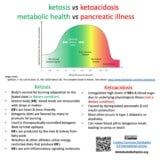Chris Palmer, MD: Ketogenic therapy may help stop seizures

This dietary treatment, the ketogenic diet, based on ancient medicine, is making a comeback as a treatment for epilepsy.
Dr. Palmer‘s perspective on the ketogenic diet controversy
- The keto diet is one of today’s most controversial diets, so the idea of using the ketogenic diet to treat seizures sounds surprising.
- Celebrities rave about it as a weight loss tool, while some health care professionals and organizations say that it is dangerous.
- Some medical clinics are opening up with serious, credible doctors using medical ketogenic diets to treat serious medical conditions such as diabetes.
- The medical ketogenic diet has been an effective treatment for epilepsy for a century (1).
- Effective epilepsy treatment: 50% of patients were seizure-free, Another 35% were markedly improved with this intervention.
- Compelling evidence exists illustrating that the keto diet helps children with treatment-resistant epilepsy. A Cochrane review (Martin et al, 2016)
- Adults with treatment-resistant epilepsy don’t do as well. The evidence is much less compelling.
- Why? Any diet is difficult for people, and the medical ketogenic diet is even more difficult
- Current keto education and support can make the diet easier to adhere to.
Connections between epilepsy and psychiatric illnesses
- Well-documented commonalities exist between epilepsy and mental illnesses including depression, anxiety, schizophrenia, and bipolar disorder.
- Psychiatric illnesses and epilepsy are often treated with the same anticonvulsant medications.
- Psychiatry and neurology both treat brain disorders even though they are differently labeled as “neurological” or “mental” disorders.
- The ketogenic diet has profound effects on the brain
Ketogenic diet as a medical intervention
- The ketogenic diet has a long history as a powerful medical intervention.
- I strongly recommend you consult with a licensed healthcare professional if you are considering using the ketogenic diet as a treatment. Why? Because mental and medical disorders are serious – and sometimes dangerous – and you should have help, and medical supervision to implement any treatment in a safe and effective way.
Here’s the original article by Dr. Chris Palmer, MD










